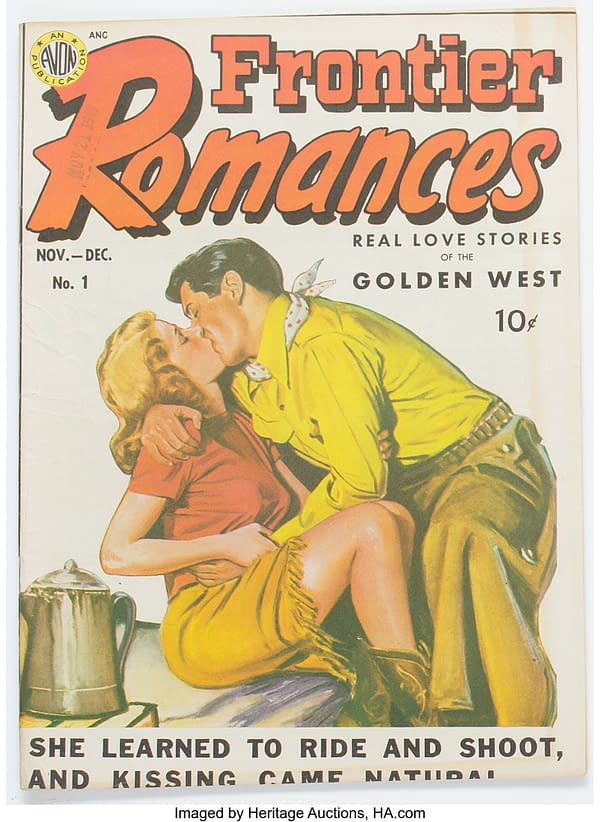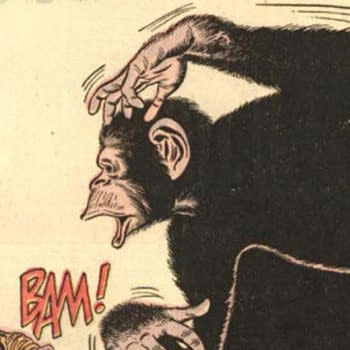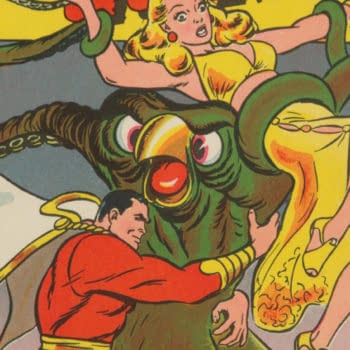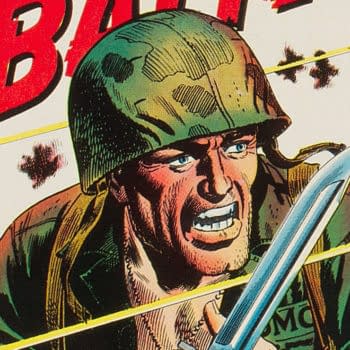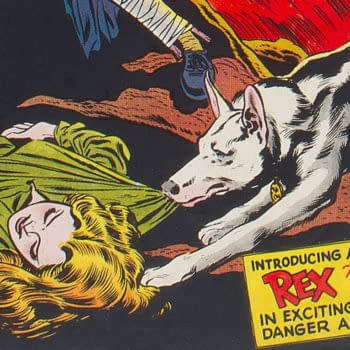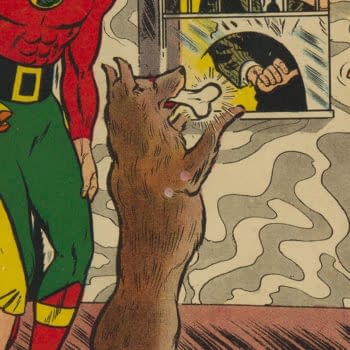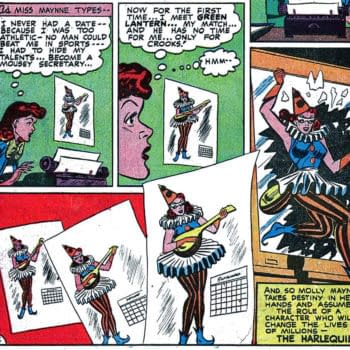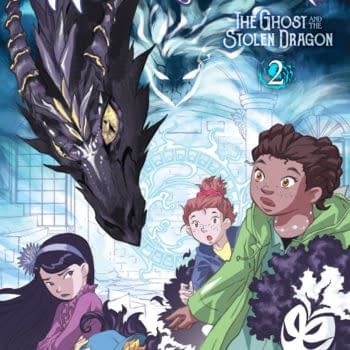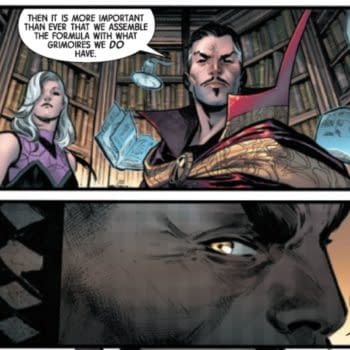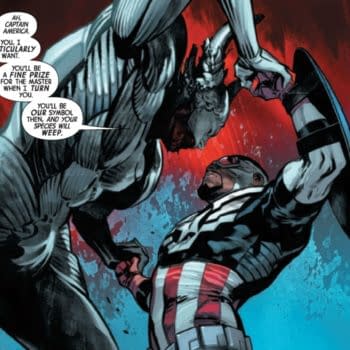Posted in: Comics, Heritage Sponsored, Vintage Paper | Tagged: Avon Publications, Fredric Wertham, Romance Comics, Seduction of the Innocent
Avon's Frontier Romances #1 in Seduction of the Innocent, at Auction
Frontier Romances #1 features a cover by Gloria Stoll Karn and an interior story with what Fredric Wertham called "Erotic Spanking"
Article Summary
- Avon’s Frontier Romances #1 features a cover by Gloria Stoll Karn who is best known for her pulp covers.
- The comic includes content from Wertham's Seduction of the Innocent highlighting "Erotic Spanking".
- Avon Publications evolved from Ogilvie's 19th-century mass-market paperback roots.
- Avon was acquired by Hears in 1959 and is now a HarperCollins romance imprint.
Primarily known as a paperback publisher, Avon Publications established a reputation for material that usually leaned into what has come to be called exploitation fiction material featuring provocative or shocking covers. This made Avon something of a natural fit for the late 1940s comic book industry. Some of the company's painted comic book covers were reused from its paperback line, but the cover of its first romance comic book, Frontier Romances #1, is an interesting exception. This painting by Gloria Stoll Karn had appeared on Popular Publications' Rangeland Romances just a few months before this use by Avon. While it's unknown how Karn's painting came to be used on Popular's pulp and Avon's comic just months apart, it's undeniably a strong start for the publisher's entry into romance comics, with it's breathless cover blurb, "She learned to ride and shoot, and kissing came natural."
Frontier Romances #1 is best known for its inclusion of a panel drawn by Walter T. Johnson from the story Tangled Love, which is included among Seduction of the Innocent's infamous illustrations with the caption "Erotic spanking in a children's comic book." About such material in Western-themed comics, Wertham would also go on to say, "In Western comic books, the erotic spanking of a girl by a man is frankly featured."
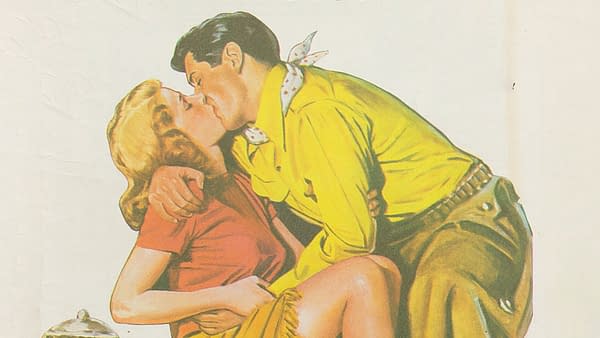
Although the title would not last, all of these elements serve to make Frontier Romances #1 an on-point entry to the comic book romance market for Avon, whose paperbacks were often similarly salacious. An underappreciated romance comic book from the genre's classic era, there's a copy up for auction in the 2024 February 29 – March 1 Golden Age Romance Featuring Fox Comics & Comic Art Showcase Auction #40258.
About Avon Publications
The roots of Avon Publications trace an interesting path through the history of the cheap mass market collected and reprint edition in America. The oldest thread of the company began under publisher John Stuart Ogilvie who started his own publishing firm, best known as J.S. Ogilvie Publishing Company or J.S. Ogilvie & Co., in 1868. Sometime prior to 1880, Francis S. Street of the legendary Street & Smith publishing company became a partner in Ogilvie's firm. In 1880, Ogilvie entered into an agreement with Street & Smith to exclusively collect and reprint Street & Smith material in library format (essentially, quarto-sized editions with paper covers) with a series called People's Library. This arrangement had fallen apart due to royalty disputes by the end of the 1880s, with Street & Smith going on to successfully publish their own libraries and becoming one of America's most successful "thick book" publishers, a format which is for all practical purposes the kind of standard paperback format we're familiar with today.
J.S. Ogilvie & Co continued on with their own library and thick book (among other formats) releases using other source material. After John Stuart Ogilvie's 1910 death, the firm passed onto his sons Donald and Frank, who seem to have remained in charge of the company until their own deaths in 1936 and 1937 respectively. By this time, the company maintained a back catalog of self-help, "home study" and a dizzying array of other non-fiction and fiction titles in clothbound and various formats of paperback editions with a heavy mail-order sales presence.
At this point, the company came under the control of Joseph Meyers and his sister Edna Meyers Williams. By some accounts, American News Co. subsequently helped fund Meyers' 1941 transformation of J.S. Ogilvie into the paperback publisher Avon. As Two-Bit Culture: The Paperbacking of America describes it, American News Co. set about finding a competitor for Pocket Books after getting shut out of Pocket Books' decision to go with independent distribution rather than ANC. However, the indispensable The Paperbound Book in America describes Pocket Books' decision to go independent as the result of a lack of cooperation on ANC's part.
Meyers and Williams had run publishing businesses beginning around 1928 with Illustrated Editions Company and related companies. According to Meyers' 1943 testimony in Pocket Books v Avon, he had been in the book business in some form since 1923. While one source maintains he was an employee of J.S. Ogilvie during that period, his testimony during that lawsuit has him running a retail bookshop and a mail-order book business prior to entering publishing. While it's possible that his mail-order business had some connection to J.S. Ogilvie's own operations in that area, there's no apparent reason for him to conceal any direct employment here. Prior employment with that firm would have likely further strengthened his case against Pocket Books.
This said, some degree of American News Co. involvement in this scenario also makes sense, as acquiring the J.S. Ogilvie IP for use in a rival to Pocket Books would prove to be a tactical masterstroke. When Pocket Books sued Avon for unfair competition, claiming the Avon line was too similar to the look and feel of Pocket Books, Avon's defense repeatedly fired back with examples from J.S. Ogilvie's decades-long use of the highly similar thick book format. Avon's lawyer returned again and again to specific examples from throughout that history which had various prior characteristics similar to Pocket Books' claims. And though this irony was lost on those in the courtroom, the defense also used examples from one-time J.S. Ogilvie business partner Street & Smith, including their use of the term "Pocket Edition."
Avon successfully defended itself in this action, but whatever role ANC might have played in this scenario, the resulting distribution arrangement would soon become frayed. From 1953 to 1956, Avon and ANC would engage in a series of lawsuits over Avon's use of the separate corporate entity Avon Book Sales Corporation in what ANC construed as an end run around their exclusive distribution contract.
Along the way, Avon published over 100 comic book titles from 1945 to 1956, most of them extremely short-lived. Avon Books also sporadically published paperback format collections of newspaper comics and similar material throughout that period and continued to do so through the mid-1990s. The company was acquired by Hearst in 1959 and is currently a romance imprint of HarperCollins, where it has been active through at least 2019.
